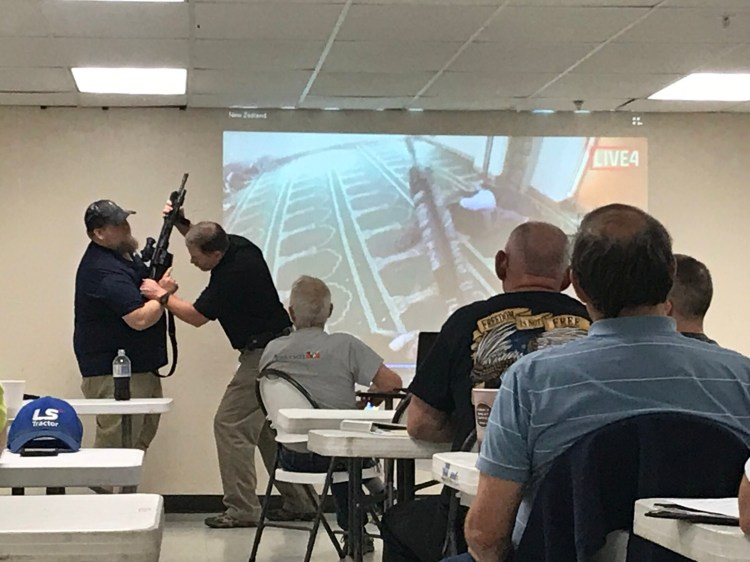Winslow police Chief Sean O’Leary remembers the horror he felt the day he turned on the news and saw the coverage of the 2015 South Carolina church shooting, a racially motivated attack in which nine black churchgoers were gunned down fatally by an admitted white supremacist.
This incident, as well as an additional 15 acts of violence that have occurred in houses of worship in the last seven years, motivated O’Leary to begin working on a solution to the rising threat of violence targeted toward religious institutions.
“When you think of events like this, everyone’s minds immediately go to school shootings,” O’Leary said. “Unfortunately, now with the hate and discontent in this world, these acts of violence are happening in churches, mosques and synagogues as well.”
After brainstorming with local religious leaders and fellow law enforcement personnel, O’Leary and the Winslow Police Department hosted their first Houses of Worship Safety Seminar on Saturday. The event drew a turnout of more than 40 people from 12 religious institutions across central Maine, a fact that couldn’t have made O’Leary any happier.
“This is the first event like this around here, and I wanted to gauge the interest people had,” O’Leary said. “I’m very pleased to see so many people here today.”
When O’Leary began planning the seminar, he could think of no one more qualified to lead it than his longtime friend and former colleague, Peter Joyce.
Joyce, who’s been in been in law enforcement for the better part of 30 years, is a third-generation Portland police officer. While working for the city, Joyce co-founded and served on the department’s Special Reaction Team for more than 24 years before working for the U.S. Marshals Service security detail at Portland’s federal courthouse.

Seminar director Peter Joyce, speaking Saturday in Winslow to representatives of many central Maine religious groups, explains how to develop an emergency action plan for use in case of a violent attack. Morning Sentinel photo by Molly Shelly
After Joyce retired from his position with the U.S. Marshals, he decided to use his expertise in special reaction training to educate others. He founded Special Reaction Team Concepts in 2014. SRT specializes in training civilians and law enforcement officers how to use firearms properly and prepare adequately for high-stress events that might warrant self-defense. The company’s tagline is “mindset, preparedness, skill, tactics, gear.”
“I not only train people to react properly with their firearms during these stressful situations, but I also train them in their mindset,” Joyce said. “I train them in their tactics. That way people can make good decisions during potentially violent occurrences.”
Joyce’s presentation focused on multiple things: developing a church safety plan, assessing the risk factors and situational awareness, dealing with angry and aggressive behavior, warning signs of an assault, and the use of force.
Though the seminar did focus on teaching attendees how to respond in the event of a violent attack, Joyce also discussed how churches should assess and manage situations such as criminal acts, drug incidents, medical emergencies, natural disasters and mental illness.
“Churches are beginning to realize that complacency is not an option anymore,” said Wayne Denny, Winslow’s police and firefighter chaplain. “It’s not just the violence we need to be prepared for, but also sexual assaults, drug incidents, things like that.”
Denny, who also is a pastor at Cornerstone Christian Fellowship in Vassalboro, said they’re now learning to develop teams and master skills that go beyond just having a small security presence in the building during Sunday services.
“Me and many of the attendees today went to the sheepdog seminar in Bangor last month, and that was an eye-opening experience,” Denny said. “What we learned there was that houses of worship need more training, and we decided we needed to spread the word.”
Joyce’s workshop included statistics on the recent wave of violence targeted toward religious institutions as well as interactive demonstrations of self-defense and disarming intruders, interactive videos, organizational tips, and step-by-step planning guides for congregation members looking to establish a stronger security team.
Most importantly, Joyce emphasized the dangers that lie within the beliefs that people hold when considering the possibility of danger, better known as the “normalcy bias.”
“Every day that goes by where someone doesn’t experience danger or violence, they get less aware and are less likely to be able to identify those types of situations,” Joyce said. “The normalcy bias is the biggest way people become victims.”
Chief O’Leary hopes that the seminar not only taught the attendees important information but also that other police departments take action and host similar events in order to teach their communities how to protect themselves in their houses of worship.
Send questions/comments to the editors.




Comments are no longer available on this story